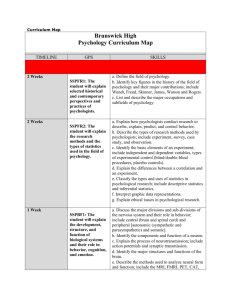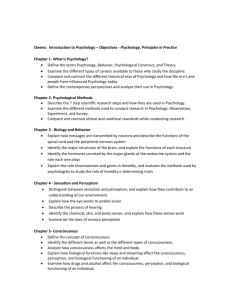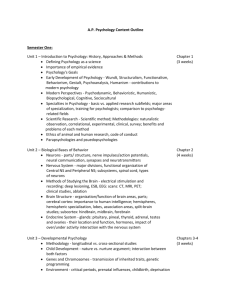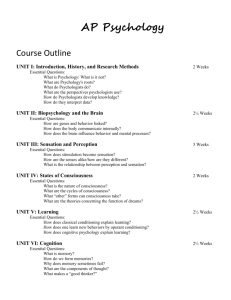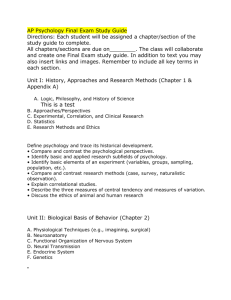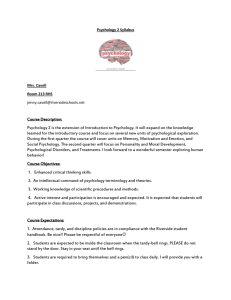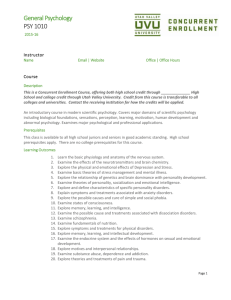ap psychology - Reeths
advertisement
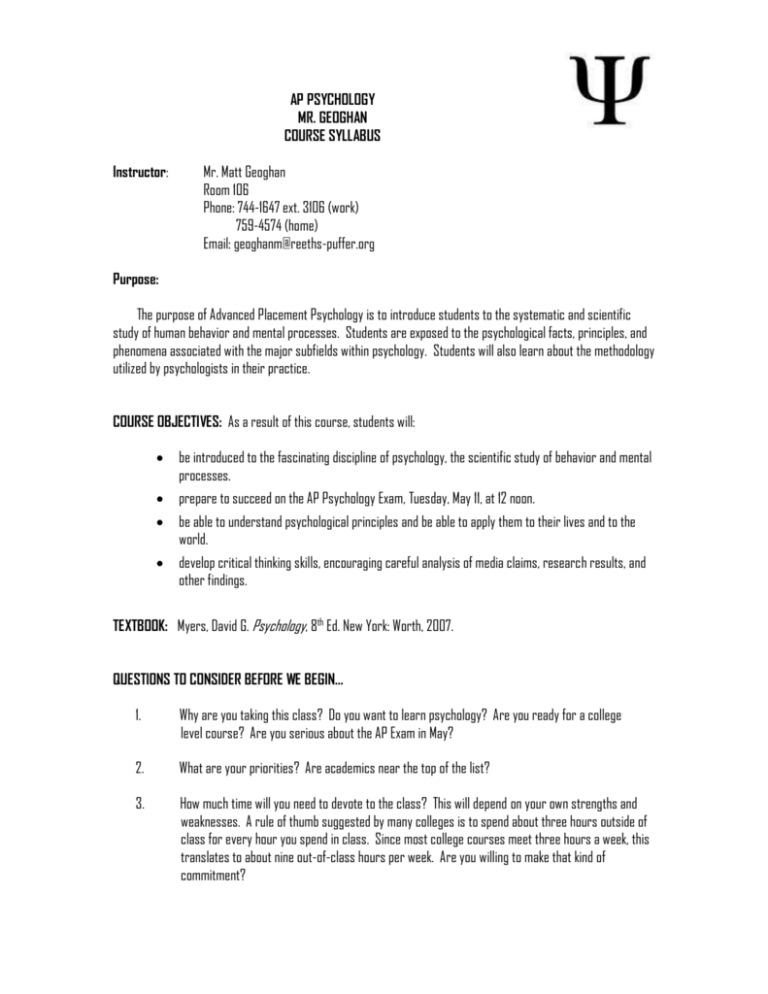
AP PSYCHOLOGY MR. GEOGHAN COURSE SYLLABUS Instructor: Mr. Matt Geoghan Room 106 Phone: 744-1647 ext. 3106 (work) 759-4574 (home) Email: geoghanm@reeths-puffer.org Purpose: The purpose of Advanced Placement Psychology is to introduce students to the systematic and scientific study of human behavior and mental processes. Students are exposed to the psychological facts, principles, and phenomena associated with the major subfields within psychology. Students will also learn about the methodology utilized by psychologists in their practice. COURSE OBJECTIVES: As a result of this course, students will: be introduced to the fascinating discipline of psychology, the scientific study of behavior and mental processes. prepare to succeed on the AP Psychology Exam, Tuesday, May 11, at 12 noon. be able to understand psychological principles and be able to apply them to their lives and to the world. develop critical thinking skills, encouraging careful analysis of media claims, research results, and other findings. TEXTBOOK: Myers, David G. Psychology, 8th Ed. New York: Worth, 2007. QUESTIONS TO CONSIDER BEFORE WE BEGIN… 1. Why are you taking this class? Do you want to learn psychology? Are you ready for a college level course? Are you serious about the AP Exam in May? 2. What are your priorities? Are academics near the top of the list? 3. How much time will you need to devote to the class? This will depend on your own strengths and weaknesses. A rule of thumb suggested by many colleges is to spend about three hours outside of class for every hour you spend in class. Since most college courses meet three hours a week, this translates to about nine out-of-class hours per week. Are you willing to make that kind of commitment? 4. Are you a strong reader? In terms of course assignments, nothing will occupy more of your time than reading and studying the text. Research has shown that the strongest correlate of success in high school AP classes is reading ability. If you are a good reader, you have a distinct advantage. If you are not a good reader, please know that it is going to require extra time and effort on your part to compensate. COURSE REQUIREMENTS: Read and outline each chapter of the text (I will give you tips before the first reading assignment) keep a library of note cards covering the vocabulary take notes in class do outside readings conduct simple experiments and analyze the data write essays, create projects, utilize the internet participate in class discussions and group work take practice tests, write rubrics, score essays, and learn strategies for test-taking attend class—choose class over student government activities, or other in-school fun stuff (just say no to missing class!) if you miss a quiz or test it is up to you to make it up after school, 1 day for a quiz and 3 days for a test, failure to do so will result in a zero projects and papers are due on the assigned due date, whether you are present or not TIPS FOR STUDENTS IN AP PSYCHOLOGY: 1. Don’t miss class. Don’t play catch-up! 2. Keep up with the reading schedule. Brain research indicates that studying in smaller doses spread out over time improves learning and retention far more than cramming a lot all at once. Your short term memory can only hold about 7 pieces of information for only short amount of time. Without repetition and/or practice this information will be lost or skewed. 3. Take complete notes. Take notes during reading and lectures. Don’t try write down everything that I say. Learn to pick out the main points of the lecture. Put them in your own words. Don’t write down something you don’t understand without asking about it. Date your notes and identify the corresponding chapter to stay organized. 4. Learn to read effectively! Preview the chapter quickly before you begin. Read actively; don’t just look at words. Take notes as you read. As you read make notes in PENCIL in the margin of your book or keep a note card close by. Write down questions as you go. Pause periodically and summarize the reading to yourself. Do not try to read an entire chapter at once. Divide it into sections. Pay attention to pictures, diagrams, cartoons and sidebars. Myers does a great job of making them relevant and helpful. 5. Half the battle is vocabulary! I strongly suggest you make your own set of flash cards. The textbook’s website has flash cards you can print. For some of you Psychology is a new subject, the terminology is going to be new, sometimes foreign. Don’t perpetuate ignorance by just passing over an item you don’t know, look it up or ask. 6. Form a study group. Your study group will help answer questions. You can divide up the flash card creation work and then use them to quiz each other. You will likely learn a great deal more if you study with others. WHAT I EXPECT FROM YOU: To assume responsibility for all of your behavior. There are no excuses. Ask appropriate questions Wait to talk during whole class discussions until you are called on –everyone needs a chance to think and formulate ideas Know and follow procedures for this class. Be prepared for every class period, bring something to the table. Go to the bathroom and take care of personal matters prior to getting to class. Bring all class materials every day without returning to your locker. You are responsible for all work, including getting notes and assignments from days you are absent and submitting that work on time according to the policy in your student handbook. Have a positive attitude about the course and your ability to do well. COURSE OUTLINE: UNIT I : History, Approaches and Research Methods; Prologue & Chapter 1 (4 weeks) I. History and Approaches (2-4%) A. Logic, Philosophy, and History of Science B. Approaches 1. Biological 2. Behavioral 3. Cognitive 4. Humanistic 5. Psychodynamic 6. Sociocultural II. Methods (6-8%) A. Experimental, Correlational, and Clinical Research 1. Correlational (e.g., observational, survey, clinical) 2. Experimental B. Statistics 1. Descriptive 2. Inferential C. Ethics in Research UNIT II: Physiological and Developmental Psychology; Chapters 2, 3 & 4 (6 weeks) I. Biological Bases of Behavior (8-10%) A. Physiological Techniques (e.g., imaging, surgical) B. Neuroanatomy C. Functional Organization of Nervous System D. Neural Transmission E. Endocrine System F. Genetics II. Developmental Psychology (7-9%) A. Life-Span Approach B. Research Methods C. Heredity-Environment Issues D. Developmental Theories E. Dimensions of Development 1. Physical 2. Cognitive 3. Social 4. Moral F. Sex Roles, Sex Differences UNIT III: Consciousness, Learning and Cognition; Chapters 7, 8, 9, 10 & 11 (6 weeks) I. States of Consciousness (2-4%) A. Sleep and Dreaming B. Hypnosis C. Psychoactive Drug Effects II. Learning (7-9%) A. Biological Factors B. Classical Conditioning C. Operant Conditioning D. Social Learning E. Cognitive Processes in Learning III. Cognition (8-10%) A. Memory B. Language C. Thinking D. Problem Solving and Creativity UNIT IV: Motivation, Emotion, Sensation and Perception; Chapters 12, 13, (14), 5 & 6 (5 weeks) I. Motivation and Emotion (7-9%) A. Biological Bases B. Theories of Motivation C. Hunger, Thirst, Sex, and Pain D. Social Motives E. Theories of Emotion F. Stress II. Sensation and Perception (7-9%) A. Thresholds B. Sensory Mechanisms C. Sensory Adaptation D. Attention E. Perceptual Processes UNIT V: Testing and Sociological Differences; Chapters 1, 3,11 & 18 (5 weeks) I. Testing and Individual Differences (5-7%) A. Standardization and Norms B. Reliability and Validity C. Types of Tests D. Ethics and Standards in Testing E. Intelligence F. Heredity/Environment and Intelligence G. Human Diversity II. Social Psychology (7-9%) A. Group Dynamics B. Attribution Processes C. Interpersonal perception D. Conformity, Compliance, Obedience E. Attitudes and Attitude Change F. Organizational Behavior G. Aggression/Antisocial Behavior UNIT VI: Personality, Disorders and Treatment; Chapters 15, 16, & 17 (7 weeks) I. Personality (6-8%) A. Personality Theories and Approaches B. Idiographic and Monothetic Research C. Assessment Techniques D. Self-concept, Self-esteem E. Growth and Adjustment II. Abnormal Psychology (7-9%) A. Definitions of Abnormality B. Theories of Psychopathology C. Diagnosis of Psychopathology D. Anxiety Disorders E. Somatoform Disorders F. Mood Disorders G. Schizophrenic Disorders H. Organic Disorders I. Personality Disorders J. Dissociative Disorders III. Treatment of Psychology Disorders (5-7%) A. Treatment Approaches 1. Insight Therapies: Psychodynamic/Phenomenological Approaches 2. Behavioral Approaches 3. Cognitive Approaches B. Modes of Therapy C. Community and Preventive Approaches UNIT OBJECTIVES: Unit I: History, Approaches and Research Methods - Define psychology and trace its historical development. - Compare and contrast the psychological perspectives. - Identify basic and applied research subfields of psychology. - Identify basic elements of an experiment. - Compare and contrast research methods. - Explain correlational studies. - Describe the three measures of central tendency and measures of variation. - Discuss the ethics of animal and human research. Unit II: Physiological and Developmental Psychology - Explain why psychologists are concerned with human biology. - Describe the ill-fated phrenology theory. - Explain how someone’s physiological make-up affects human behavior. - Describe the parts of a neuron and how an impulse is created. - Describe how nerve cells communicate. - Explain how drugs affect neurotransmission. - Describe the parts and divisions of the nervous system. - Give examples of differences and similarities within the human race. - Describe the influences of genetics on behavior. - Identify the potential promise and perils of molecular genetics research. - Discuss the survival benefits of culture. - Explain how changes in the genetic gene pool influence individual and cultural behavior. - Discuss different methods of child rearing and the pros and cons respectively. - Discuss gender differences and expectations within cultures. - Define and discuss the different stages of prenatal development. - Discuss the four areas of development as they apply during different stages of life. (Physical, Social, Emotional and Cognitive) - Discuss the onset and development of temperament and sense of self. - Explain different theories of development in accordance to each given area; physical, social, emotional or cognitive. - Summarize the contributions of cross-sectional and longitudinal studies to our understanding of the normal effects of aging on adult intelligence. - Describe trends in people’s life satisfaction across the life span. Unit III: Consciousness, Learning and Cognition - Discuss the history of psychology’s study of consciousness and information processing. - Distinguish four types of biological rhythms with examples. - List the stages of sleep and explain the differences. - Describe the importance of circadian rhythm. - Identify the possible reasons or purposes of sleep. - Discuss sleep deprivation. - Identify the major sleep disorders. - Discuss the most common contents of dreams and the purpose of dreaming. - Define psychoactive drug. - Discuss the nature of drug dependence, and identify three common misconceptions about addiction. - Name the main categories of psychoactive drugs, and list three ways they can interfere with neurotransmission in the brain. - Define learning and identify two forms. - Define classical conditioning and behaviorism and their basic components. - Summarize Pavlov’s contribution to our understanding of learning. - Describe some uses of classical conditioning to improve human health and well-being. - Identify the two major characteristics that distinguish classical conditioning from operant conditioning. - State Thorndike’s law of effect, and explain its connection to Skinner’s research. - Describe the shaping procedure and its relationship to discriminating behavior. - Describe the process of observational learning. - Explain why correlations cannot prove that watching violent TV causes violent behavior. - Define memory, and explain how flashbulb memories differ from other memories. - Discuss the different methods and modes of processing. - Compare the benefits of different means encoding. - Describe the duration and working capacity of short-term and long term memory. - Discuss the synaptic changes that accompany memory formation and storage. - Discuss some ways stress hormones can affect memory. - Define cognition. - Compare algorithms and heuristics as problem-solving strategies, and explain how insight differs from both of them. - Explain how our preexisting beliefs can distort our logic. - Describe the basic structural units of a language. - Trace the course of language acquisition. - Summarize Whorf’s linguistic determinism hypothesis, and comment on its contemporary psychology. - Discuss the advantage of thinking in images. - Outline the arguments for and against the idea that animals and humans share the capacity for language. - Present arguments for and against considering intelligence as one general mental ability. - Compare Gardner’s and Sternberg’s theories of intelligence. - Describe the four aspects of emotional intelligence. - Describe the relationship between intelligence and brain anatomy. Distinguish between aptitude and achievement tests. Discuss the two extremes of the normal distribution of intelligence. Discuss the evidence for the genetic and environmental contributions to individual intelligence. Unit IV: Motivation, Emotion, Sensation and Perception - Define motivation. - Discuss and explain the four theories of motivation. - Describe the physiological determinants of hunger. - Discuss psychological and cultural influences on hunger. - Describe the human sexual response cycle, and discuss some causes of sexual disorders. - Discuss the impact of hormones on sexual motivation and behavior. - Discuss the role of external stimuli and fantasies in sexual motivation and behavior. - Discuss the research on environmental and biological influences on sexual orientation. - Discuss the place of values in sex research. - Describe the adaptive value of social attachments. - Define achievement motivation. - Identify and describe the theories of emotions. - Discuss the relationship between arousal and performance. - Describe some physiological and brain patterns specific to emotions. - Describe some of the factors that affect our ability to decipher non-verbal cues. - Discuss the cultural influence on the expression and interpretation of emotions. - State ways in which we learn fear. - Discuss the biological components of basic emotions. - Identify some behavior-related causes of illness and death. - Describe the process and ways in which the body deals with stress. - Discuss the health consequences of catastrophes, significant life changes, and daily hassles. - Describe the effect of stress on the immune system. - Discuss the findings which link the correlation between stress and certain illnesses. - Distinguish between absolute and difference thresholds. - Discuss sensation and perception - Describe sensory adaptation and habituation. - Define transduction and visual system stimulation. - Describe the major parts and functions of the sensory receptors. - Explain the Young-Helmholtz, trichromatic, and opponent processing theories. - Explain the importance of the perceptual constancies. - Describe the relationship between attention and perception. - Explain the contributions of Gestalt to understanding perception. - Explain and describe the differences between monocular and binocular vision. - Define perceptual set. - Explain how one stimulus can invoke different perceptions given the context. Unit V: Testing and Sociological Differences - Describe bias and hindsight bias. - Describe how overconfidence contaminates judgment. - Identify the advantages of the various methods of research. Describe positive and negative correlations. Explain how experiments help isolate cause and effect. Explain the difference between an independent and a dependent variable. Explain the various means of reporting data. Describe the three measures of central tendency. Explain the value of simplified laboratory conditions in discovering general principles of behavior. Discuss whether psychological research can be generalized across cultures and genders. Further explain why psychologists study animals, and discuss the ethics of experimentation with both animals and humans. Discuss the survival benefits of culture. Explain why changes in human gene pool cannot account for culture change over time. Describe some ways that humans are similar, despite their cultural differences. Identify some biological and psychological differences between males and females. Discuss the importance of environment in the development of gender roles. Describe the biopsychosocial approach to development. Present arguments for and against considering intelligence as one general mental ability. Compare Gardner’s and Sternberg’s theories of intelligence. Describe the relationship between intelligence and brain anatomy. Define intelligence test and discuss intelligence testing. Distinguish between aptitude and achievement tests, and describe modern tests of mental abilities. Describe the distribution of scores in a normal curve. Explain what it means for a test to be valid and reliable. Discuss the stability of intelligence scores over the life span. Discuss evidence for the genetic contribution of intelligence, and what is meant by heritability of intelligence. Describe the environmental and cultural influence on intelligence. Describe gender differences in abilities. Discuss whether intelligence tests are biased, and describe the stereotype threat phenomenon. Describe the chameleon effect. Discuss Asch’s experiments on conformity, and distinguish between normative and informational social influence. Describe Milgram’s experiments on obedience, and outline the conditions in which obedience was highest. Explain how the conformity and obedience studies can help us understand our susceptibility to social influence. Discuss how group interaction can facilitate group polarization and groupthink. Identify the characteristic common to minority positions that sway majorities. Identify the three components of prejudice. Discuss the social factors that contribute to prejudice. Cite four ways that cognitive processes help create and maintain prejudice. Outline four psychological triggers of aggression. Discuss the effects of violent video games on social attitudes and behavior. Define attitude. Describe the conditions under which attitudes can affect actions. - Explain how the foot-in-the-door phenomenon, role-playing, and cognitive dissonance illustrate the influence of actions on attitudes. Unit VI: Personality, Disorders and Treatment - Define personality. - Explain how Freud’s experiences in private practice led to his theory of psychoanalysis. - Discuss Freud’s view of the mind as an iceberg. - Discuss Freud’s view of personality structure, and discuss the interactions of the id, ego, and superego. - Identify the stages of Freud’s psychosexual development and describe the effects of fixation on behavior. - Describe the function of defense mechanisms. - Contrast the views of non-Freudian theorists. - Summarize the current assessment of psychoanalysis. - Summarize Abraham Maslow’s concept of self-actualization. - Discuss Roger’s person-centered perspective. - Explain the humanistic assessment of personality. - Identify the Big Five personality factors, and discuss some of the strengths of this approach to studying personality. - Discuss the effects of a perception of internal or external control, and describe the concept of learned helplessness. - Identify the criteria for judging whether behavior is psychologically disordered. - Describe the goals and content of the DSM-IV. - Discuss the potential dangers and benefits of using diagnostic labels. - Define anxiety disorders, and explain how these conditions differ from normal feelings of stress, or uneasiness. - Contrast the symptoms of generalized anxiety disorder and panic disorder. - Explain how a phobia differs from the fears we all experience. - Describe the symptoms of OCD. - Discuss the contributions of the learning and biological perspectives to our understanding of the development of anxiety disorders. - Define mood disorders, and contrast major depressive disorder and bipolar disorder. - Describe the symptoms of schizophrenia, and differentiate delusions and hallucinations. - Discuss the genetic and psychological factors that may be early warning signs. - Contrast the three clusters of personality disorders, and describe the behaviors and brain activity associated with antisocial personality disorder. - Discuss the prevalence of psychological disorders, and summarize the findings of socioeconomic status and serious psychological disorders. - Discuss some ways that psychotherapy, biomedical therapy, and an eclectic approach to therapy differ. - Define psychoanalysis, and discuss the aims of this form of therapy. - Describe some of the methods used in psychoanalysis, and list some criticisms of this form of therapy. - Contrast psychoanalysis therapy and interpersonal therapy with traditional psychoanalysis. - Identify the basic characteristics of the humanistic therapies, and describe the specific goals and techniques of Carl Rogers’ client-centered therapy. Explain how the basic assumption of behavior therapy differs from those of traditional psychoanalytic and humanistic therapies. Define counterconditioning, and describe the techniques used in exposure therapies and aversive conditioning. Contrast cognitive therapy and cognitive-behavior therapy, and give some examples of cognitive therapy for depression. Discuss the rationale and benefits of group therapy, including family therapy. Discuss the role of values and cultural differences in the therapeutic process. Define psychopharmacology, and explain how double-blind studies help researchers evaluate a drug’s effectiveness. Describe the characteristics of antipsychotic drugs, and discuss their use in treating schizophrenia. Describe the characteristics of antianxiety drugs. Describe the characteristics of antidepressant drugs, and discuss their use in treating specific disorders. Describe the use of electroconvulsive therapy in treating severe depression, and discuss some possible alternatives to ECT. Explain the rationale of preventative mental health programs.
